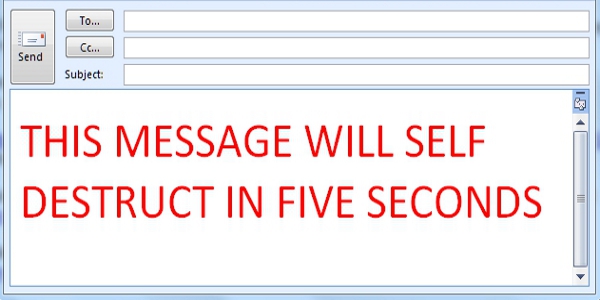by Jamison Shabanowitz, Laurence E. Richardson Legal Intern for 2013
If an email is sent to a recipient and is deleted before the recipient sees it, does it really exist?
AT&T’s new patent pending technology answers that question with an affirmative “no.”
The U.S. Patent Office released details about the company’s patent for a self-deleting email last month that will become a feature in their forthcoming client system and server application. While this technology may act as a fail-safe for those who send careless or embarrassing emails, AT&T’s patent may also put pressure on information technology policy in Virginia and every state and local government to guard against public bodies hiding non-FOIA-exempted information through self-destructing emails.
In the short-term, when it is eventually available to the public, self-deleting email will be limited to AT&T-developed systems. Virginia state law does not proscribe the specific kind of email system governments must use. The General Assembly passed this duty on to the Chief Information Officer (CIO) and other top administrators of the Virginia Information Technology Agency (VITA).[1] Only State agencies fall under VITA oversight, leaving local governments and other than agencies (e.g. institutions of higher education) to make their own decisions regarding the email client and server provider. In 2009, VITA ordered all state agencies to conform to the same Enterprise-class Microsoft Exchange system, not an AT&T system that may soon feature the advanced self-deleting technology.[2]
Most systems, including Exchange, already have an available feature to delete a sent-but-unread email after a prescribed amount of time determined before the message is sent. AT&T hopes to expand the capabilities of the email sender to delete the correspondence regardless of whether it has been opened, and further control what can be done with the email text itself once received.
Future CIOs and VITA administrators will have to keep in mind the potential abuses to this new technology when making decisions on upgrades to the State email system. Open records advocates and government records archiving agencies should become wise to the new technology that has the potential to threaten access and maintenance of public records.
In Virginia, FOIA requests frequently ask for email communication, like the ones gathered by the Bristol Herald Courier last month about the Attorney General’s office communications with two gas companies ahead of their potential class action suit over royalties. If emails are automatically deleted, government bodies will have to evoke the “records do not exist” official answer[3] to FOIA requests more often. Legal challenges may then arise, as the requesters of information may believe that the government is hiding the specified document. The government may compose an incomplete summary of the no-longer-existing document.
The introduction of the advanced self-deleting email could cost those wanting access to government records more time and money.
One thing that is for certain is the lawmakers should prepare for rapid technological change concerning email. Self-terminating emails and advanced control of sent emails by the sender is innovative, but updated laws are necessary to ensure the technology may be used alongside the public interest of open records.
[1] See Va. Code §§ 2.2-2007(A), 2.2-2010(5) (describing the duties of the CIO and VITA).
[2] See Overview of Messaging End User and Agency Directory Migration (Nov. 17, 2008) http://www.vita.virginia.gov/uploadedfiles/VITA_Main_Public/unmanaged/it_partnership/transformation/Messaging_Transformation_Overview.pdf (discussing the transition to a new email system for State entities)
[3] Va. Code § 2.2-3704(B)(3)
